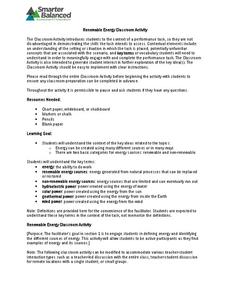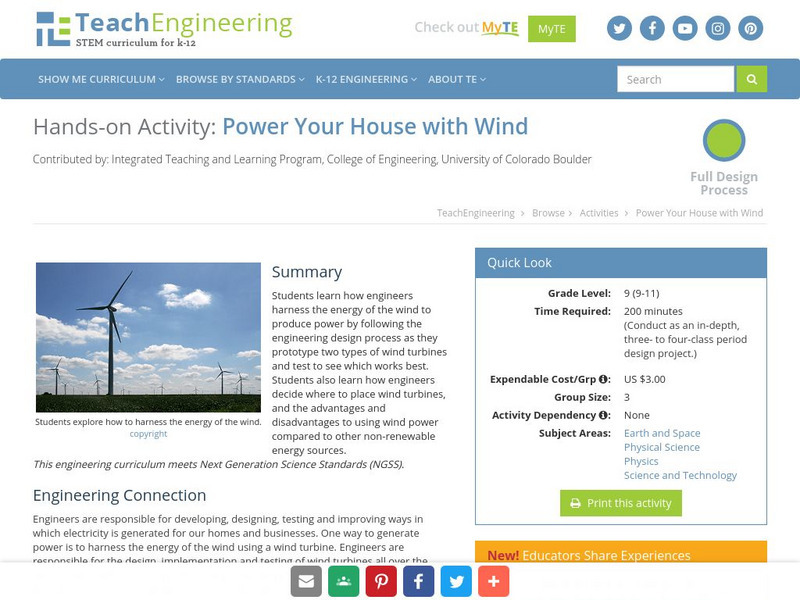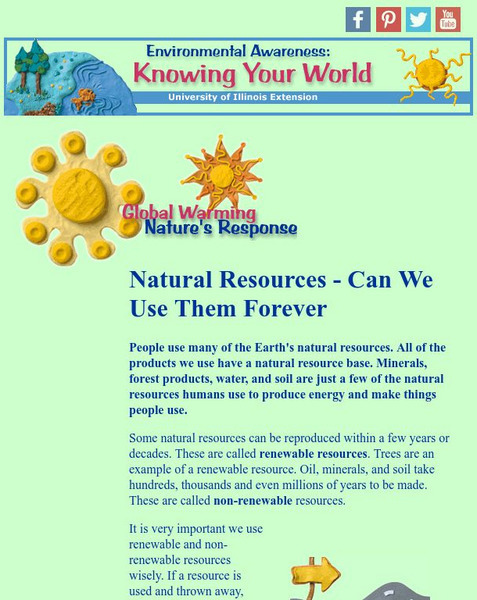Smarter Balanced
Renewable Energy
Renewable and non-renewable energy sources are the focus of a series of activities that prepare learners for a performance task assessment on energy. Groups identify the various sources of energy and classify these sources as either...
Teach Engineering
Enough Energy? Play the Renew-a-Bead Game
Pairs simulate the energy usage of different countries by drawing beads from a bag, which contain different beginning ratios of non-renewable and renewable energy resources. The activity concludes with a series of questions to tie...
It's About Time
Renewable Energy Sources - Solar and Wind
There has been a huge solar energy spill! Let's go outside to play in it. This lesson includes multiple experiments showcasing solar and wind energies. Scholars build a solar heater and an anemometer before testing the results. The...
Society of Petroleum Engineers
Renewable and Nonrenewable Energy
Energize an environmental science unit on natural resources with this collection of instructional materials. From simple coloring sheets for primary grade children, to guiding questions for a high school research...
American Chemical Society
Preparation and Combustion of Biodiesel
The United States is the world's largest producer of biofuel. During an in-class investigation, young scientists produce their own biodiesel. They burn a sample of it to determine the heat of combustion. Then they discuss the...
Teach Engineering
Building a Piezoelectric Generator
In pairs, learners build a piezoelectric generator from readily available electric components in the second and final installment of the two-part series. Tapping the piezoelectric element produces enough electricity to light an LED....
Teach Engineering
Concentrating on the Sun with PVs
Concentrate to determine the best reflector design. Pairs use the engineering design process to build a reflector to increase the current output of a photovotaic panel. Teams arrive at a final design and present it to the class along...
Teach Engineering
Ice, Ice, PV!
Knowing the temperature coefficient allows for the calculation of voltage output at any temperature. Groups conduct an experiment to determine the effects of temperature on the power output of a solar panel. The teams alter the...
Wild BC
Greenhouse Gas Guzzlers
Teams of six to eight players imagine that they are driving in a vehicle and collect balls that represent carbon dioxide emissions based on their different activities. "Greenhouse Gas Guzzler" cards tell teams how many balls to collect...
National Geographic
National Geographic: Non Renewable Energy Resources
This lesson is a simulation that has students looking at consumer, municipal, and corporate perspectives towards nonrenewable energy resources. Includes student handouts.
TeachEngineering
Teach Engineering: Renew a Bead
A quantitative illustration of how non-renewable resources are depleted while renewable resources continue to provide energy. The activity requires students to remove beads (units of energy) from a bag (representing a country). A certain...
National Geographic
National Geographic: Energy Sources and Energy Use
A brief lesson where students identify energy sources that are renewable and nonrenewable, and discuss their own energy use.
TeachEngineering
Teach Engineering: Power Your House With Wind
Students learn how engineers harness the energy of the wind to produce power by following the engineering design process as they prototype two types of wind turbines and test to see which works best. Students also learn how engineers...
US Department of Energy
U.s. Department of Energy: Coal: Our Most Abundant Fuel
The U.S. has enough coal to last for the next 200-300 years. So why are we not using more of it? This article describes the different types or "ranks" of coal, the history, and the problems with burning coal for energy.
University of Illinois
University of Illinois Extension: Schools Online: Knowing Your World: Natural Resources
This brief article emphasizing the importance of renewable and non-renewable resources urges readers to appreciate and not waste the earth's natural resources. Following the article, there is an activity, a "Mineral Search," through...
TeachEngineering
Teach Engineering: Powering Smallsburg
In this activity, students act as power engineers by specifying the power plants to build for a community. They are given a budget, an expected power demand from the community, and different power plant options with corresponding...















